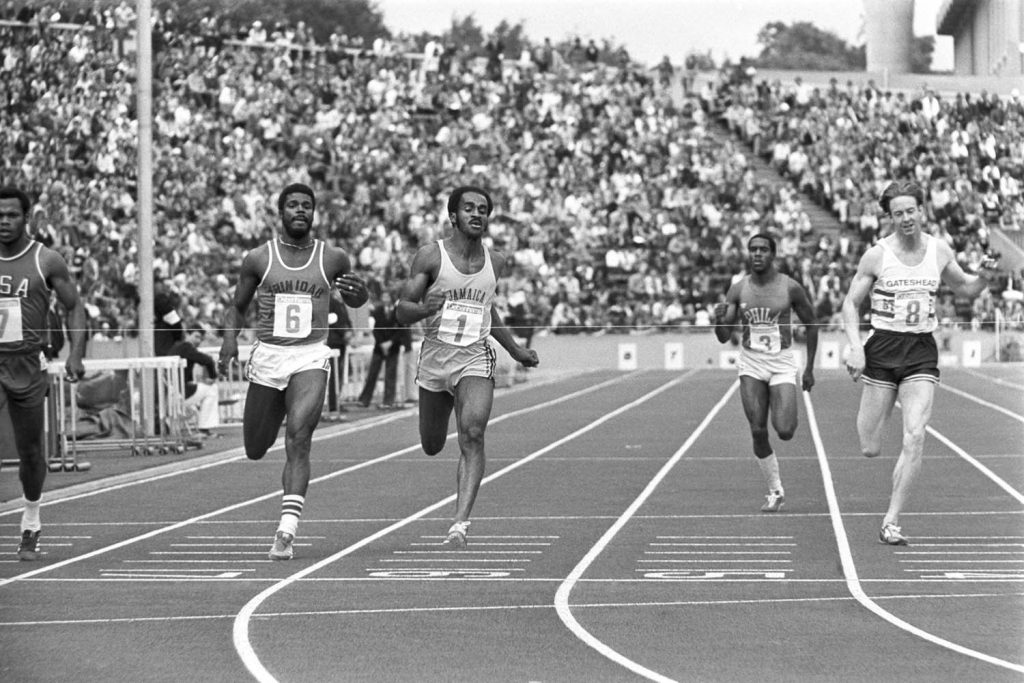Stepping up is something that Caribbean nations are accustomed to — harnessing talent, putting in the hard work, surpassing expectations by punching above our weight. It’s little surprise, then, that this talent and determination has seen us excel on the biggest sporting stage of all — ultimately stepping up to the top of the Olympic podium.
Our storied history of Olympic success is one of electrifying and emotional moments as we witness our athletes claiming gold, before hearing our national anthems played and seeing our flags raised high.
And through all those moments, no matter which country we call home, there is regional pride, support and solidarity as our Caribbean brothers and sisters take on — and beat — the rest of the world, knowing that this success is a result of nothing less than tremendous talent married to unflinching belief, endeavour, and determination.
From their very first time at the Olympic Games (in London, 1948), Caribbean athletes came to win medals — not just to participate. Those were the first Games in a world forever changed by World War II. It was the perfect setting for island nations to announce themselves as they began their journeys toward independence.
In those 1948 Games, Jamaica’s Arthur Wint and Herb McKenley kickstarted the region’s love affair with the 400 metres, finishing first and second — with Wint also taking silver in the 800m.
To prove the point, in Helsinki four years later, George Rhoden kept the 400m in Jamaican hands before teaming up with McKenely, Wint and Leslie Laing to win the 4x400m relay — the first of numerous relay wins for Caribbean nations.
Depth in sprinting is something that Jamaica has in abundance; their men and women have rarely been without a medal. In Montreal (1976), it was Don Quarrie who set the 200m track ablaze, rounding the bend at blistering speed, and never relinquishing his lead.
Deon Hemmings’ memorable 400m hurdles gold in Atlanta (1996) emphatically confirmed the “arrival” of the Caribbean women. She followed in the footsteps of the legendary Merlene Ottey, who competed in seven Olympic Games and earned nine medals — three silvers and six bronze, though none gold.
Veronica Campbell’s 200m win in Athens (2004) was a preview for Beijing 2008, where Jamaican women won seven medals, including golds for Campbell, Shelly-Ann Fraser-Pryce, and Melanie Walker. Their dominance continued with the emergence of Elaine Thompson-Herah, who won five gold medals in Rio 2016 and Tokyo 2020.
The incomparable Usain Bolt was at the forefront of this era of Jamaican dominance, with a string of unforgettable performances. But it’s his first gold medal race in 2008 — the 100m — that stands apart.
Bolt’s antics on the Beijing starting line brought an unprecedented level of showmanship and entertainment to athletics, making him a global star. After 90m, he was cruising — looking left and right, arms out breaking his stride, lacings untied on one shoe, yet crossing the finish line in a new world record.
“Then they say they never see that yet / start to finish moving like a jet”, sang calypsonian Maestro of Hasely Crawford, Trinidad & Tobago’s first gold medallist. From the unenviable position of lane one, the muscular Crawford powered his way to the 100m title in 1976, and T&T celebrated “gold, gold, the fastest human in the whole wide world” for weeks afterwards.
With Quarrie’s win in the 200m and the great Cuban, Alberto Juantorena, also capturing the 400m and 800m, it was a Caribbean clean sweep of the shorter distance events.
T&T’s male sprinters also brought home gold in 2008’s 4x100m relay, but it was Keshorn Walcott’s performance in 2012 that proved to be the biggest surprise. As reigning World Junior Champion in javelin, he was sent to the Games for experience.
But one massive throw later, on a blustery London night, he was his nation’s third gold medal winner, with a cool demeanour on the podium that belied the enormity of his achievement — becoming the youngest ever Olympic javelin champion at just 19.
London 2012 was also the stage for another Caribbean delight: Grenada’s first Olympic medal. Fittingly, it was gold. Kirani James came into the 400m as a favourite, but faced stiff competition for the coveted title.
No matter which country we call home, there is regional pride, support and solidarity as our Caribbean brothers and sisters take on — and beat — the rest of the world
From the start, his long strides and relaxed style took him past his rivals, and the 19-year-old James eased across the line, making Grenada the smallest nation to win an Olympic gold medal.
Suriname also has a single gold medal to its name, courtesy of Anthony Nesty’s heart-stopping one hundredth of a second win in the 100m butterfly in Seoul (1988). By beating more favoured swimmers from the United States and Australia, Nesty also became the first Black athlete to win an Olympic swimming gold medal.
His win reverberated around the region, to the extent that T&T issued a postal stamp to mark the accomplishment.
Cuba’s 235 Olympic medals — including 84 golds — makes them the regional gold standard in terms of precious metal. The Cold War era saw the nation prioritise sport, regarding the Olympics as an international indicator of their success (in line with the Soviet Union).
With wins across myriad disciplines — from fencing to canoeing — boxing scored them some of their greatest Olympic triumphs. In Munich (1972), heavyweight Teófilo Stevenson knocked out three opponents on his way to gold, then defended his title in Montreal and Moscow. Despite multi-million dollar offers to turn professional, he remained loyal to the Cuban revolutionary ideals.
Few will forget Shaunae Miller-Uibo’s gold at Rio 2016. In the perfect example of “wanting it” more than anyone else, in the dying moments of the 400m — with her competitors closing in on her — Miller dived across the finish line to win by seven hundredths of a second.
In Tokyo, she defended her title with a less dramatic performance, winning The Bahamas’ eighth gold medal overall — with five of them coming from 400m events, proving the nation’s strength in the discipline.
There are Caribbean nations that have yet to stand on the top step of the Olympic podium, but as each Games captures the planet’s attention for two action-packed weeks every four years, there is no shortage of inspiration for the region’s youth — from both its proud history and the promise of continued brilliance on the greatest sporting stage of all. Stay tuned.
Medal milestones
Beyond gold, there have been many significant Olympic medal wins for Caribbean athletes.
Cuba
4x100m women’s relay (silver, 1968)
When the Cuban quartet of Miguelina Cobian, Marlene Elejarde, Violetta Quesada, and Fulgencia Romay crossed the line, they not only became the first women from their nation to win an Olympic medal — they were the first for the entire Caribbean region. This landmark track performance paved the way for the many more that followed.
Jamaica
Cycling, 1km time trial (bronze, 1980)
Here, a 23-year-old David Weller took on the might of the Eastern European cycling powerhouses and shocked the sporting world with his podium place. It is still Jamaica’s only medal in a sport other than athletics.
Guyana
Boxing, bantamweight (bronze, 1980)
Michael Anthony punched his way to Guyana’s only Olympic medal, defeating opponents from Mexico, Niger, and Syria before a tough loss to the eventual gold medallist from Cuba. Anthony then embarked on a 15-year professional career.
Barbados
100m sprint (bronze, 2000)
Barbados’ first and, thus far, only Olympic medal came when Obadale Thompson became the third fastest man in the world.
Trinidad & Tobago
200m individual medley (bronze, 2004)
George Bovell III’s medal was the only one for Trinidad & Tobago in Athens 2004 (and remains its only medal in swimming) — providing a bridge between Ato Boldon’s medal-winning years of the previous two Games, and the golds to come in Beijing 2008 and London 2012 (all of which were in athletics).
Learn more about Caribbean Olympic history — including profiles of some of the athletes mentioned — at caribbean-beat.com/olympics

